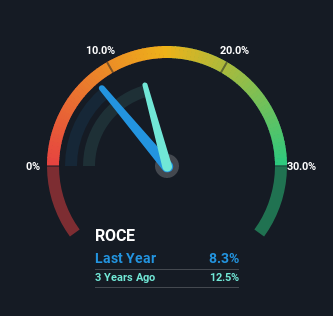- United Kingdom
- /
- Food
- /
- LSE:ABF
Returns On Capital At Associated British Foods (LON:ABF) Paint A Concerning Picture

Did you know there are some financial metrics that can provide clues of a potential multi-bagger? Ideally, a business will show two trends; firstly a growing return on capital employed (ROCE) and secondly, an increasing amount of capital employed. Put simply, these types of businesses are compounding machines, meaning they are continually reinvesting their earnings at ever-higher rates of return. However, after briefly looking over the numbers, we don't think Associated British Foods (LON:ABF) has the makings of a multi-bagger going forward, but let's have a look at why that may be.
Return On Capital Employed (ROCE): What Is It?
For those that aren't sure what ROCE is, it measures the amount of pre-tax profits a company can generate from the capital employed in its business. The formula for this calculation on Associated British Foods is:
Return on Capital Employed = Earnings Before Interest and Tax (EBIT) ÷ (Total Assets - Current Liabilities)
0.083 = UK£1.2b ÷ (UK£18b - UK£3.3b) (Based on the trailing twelve months to March 2022).
So, Associated British Foods has an ROCE of 8.3%. In absolute terms, that's a low return and it also under-performs the Food industry average of 11%.
Check out our latest analysis for Associated British Foods

Above you can see how the current ROCE for Associated British Foods compares to its prior returns on capital, but there's only so much you can tell from the past. If you'd like to see what analysts are forecasting going forward, you should check out our free report for Associated British Foods.
What Does the ROCE Trend For Associated British Foods Tell Us?
On the surface, the trend of ROCE at Associated British Foods doesn't inspire confidence. Over the last five years, returns on capital have decreased to 8.3% from 13% five years ago. However, given capital employed and revenue have both increased it appears that the business is currently pursuing growth, at the consequence of short term returns. If these investments prove successful, this can bode very well for long term stock performance.
The Bottom Line
Even though returns on capital have fallen in the short term, we find it promising that revenue and capital employed have both increased for Associated British Foods. And there could be an opportunity here if other metrics look good too, because the stock has declined 50% in the last five years. So we think it'd be worthwhile to look further into this stock given the trends look encouraging.
On a separate note, we've found 1 warning sign for Associated British Foods you'll probably want to know about.
While Associated British Foods may not currently earn the highest returns, we've compiled a list of companies that currently earn more than 25% return on equity. Check out this free list here.
New: Manage All Your Stock Portfolios in One Place
We've created the ultimate portfolio companion for stock investors, and it's free.
• Connect an unlimited number of Portfolios and see your total in one currency
• Be alerted to new Warning Signs or Risks via email or mobile
• Track the Fair Value of your stocks
Have feedback on this article? Concerned about the content? Get in touch with us directly. Alternatively, email editorial-team (at) simplywallst.com.
This article by Simply Wall St is general in nature. We provide commentary based on historical data and analyst forecasts only using an unbiased methodology and our articles are not intended to be financial advice. It does not constitute a recommendation to buy or sell any stock, and does not take account of your objectives, or your financial situation. We aim to bring you long-term focused analysis driven by fundamental data. Note that our analysis may not factor in the latest price-sensitive company announcements or qualitative material. Simply Wall St has no position in any stocks mentioned.
About LSE:ABF
Associated British Foods
Operates as a diversified food, ingredients, and retail company worldwide.
Flawless balance sheet, undervalued and pays a dividend.


